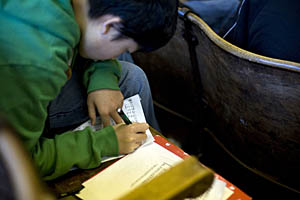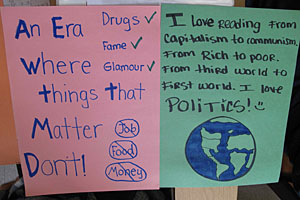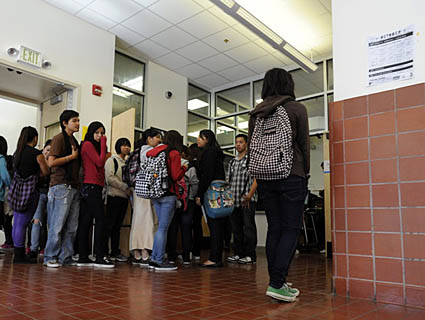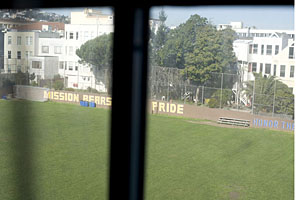
Photo: Mark Murrmann
Several teens are visibly upset when Mission High School history teacher Amadis Velez turns up the classroom lights at the end of Waiting for Superman. One student, Karina,* wipes away mascara-tinted tears. Mr. Velez and his students sit in silence for a few minutes; they’ve just finished a week of “Education and You” discussions, but the damning education documentary still hits everyone hard. “How many of you are thinking of becoming teachers?” Velez finally asks. Four hands go up. “Only four? Why?” “It’s so hard, and not enough money,” Josue says. “They ask 200% from a teacher every day,” Marisa adds.
“What will happen to Daisy?” Karina asks. Daisy is a young Latina student featured in WFS who applied for KIPP charter school admission but didn’t get in. “How many of you here applied to other schools in San Francisco that get better test scores than Mission High: Lincoln, Galileo, Lowell?” Mr. Velez responds. Six hands go up. “Did your life end after you didn’t get in and you landed at Mission?” “Noooo!” a few students respond in unison.
“Which facts in the movie shocked you?” Velez probes. “What we spend on prison inmates,” a student with a pink Valentine’s Day balloon next to her says. “How low test scores are in California and D.C.,” says a student with large headphones around his neck. “Why is everyone black and Latino in that movie?” asks one student. “Remember the achievement gap we discussed last week?” Velez reminds him.
“What were some of the most moving images?” Velez asks. “Lottery and tension,” Jakob says. “Rubber rooms,” Marisa adds. “Interviews with crying parents,” a young man adds. “Lemon dance,” the student with headphones says.
“Is the movie blaming anyone specific for these problems?” Velez asks. “Teachers!” students respond in unison. “Teacher unions too,” Marisa adds. “The contract is only to protect ‘lemons?'” she asks. “Teachers think the contract is more about the right to a fair process before you get fired,” Mr. Velez responds.
“What do you think the movie says is a solution?” Velez asks. “Charters,” Jakob responds without a pause. “Why?” Velez probes. “The movie says all kids there go to college,” Jakob responds. “That’s true, but does this happen in every charter?” Velez asks. Silence. “Did the movie say anything about that?” Velez asks again. Silence.
“Does anyone remember seeing this sentence?” Velez asks as he writes, “Only one out of five charters are successful,” on the white-erase board. Students are shaking their heads. “You don’t remember that?” Velez asks. Students are shaking their heads. “Why do you think you don’t remember that?” Velez asks. A student in glasses responds, “Did he [film director, Davis Guggenheim] make a mistake?” “Maybe,” Velez says. “But be sure to notice that all other statistics were attached to moving images of parents or students or cartoons and for some reason this fact wasn’t. That’s one of the major criticisms of the movie, that it omits this major fact,” Velez explains. “Do you think that most people will see that one sentence in the movie?” “No,” students shake their heads.
“How many charters do we see in the movie?” Velez asks. “Four,” Marisa says. “Their sample of charters is too small,” Jakob adds. “That’s a fair criticism,” Velez says. “If you were to write a review of the movie, what do you think it did well, and what would you say the movie didn’t mention?” Velez asks. He passes out homework sheets and asks every student to write a review of WFS.
“He didn’t interview teachers or students from public schools,” Marisa says. “Also, California test scores are low, but he didn’t mention how many immigrants are here. Our English test scores are bad, but that doesn’t mean our school is bad.”
“What do you think Guggenheim would think if he looked at Mission High’s test scores from the outside?” Velez asks. “Bunch of gangsters here,” the headphones-wearing student says. “Bad school,” Marisa adds. “But we don’t care about test scores!” a student in the back yells out. “Why not?” Velez asks. “They don’t help us get to college!” he responds. “What would you do then to fix schools?” Velez asks the class, as he continues to pass out homework sheets. Students take turns calling out responses: “Make the [standardized] tests more meaningful; give more money to public schools in California; enforce laws that force students to come to school; remove teacher tenure,” they say. It strikes me that Karina has been quiet for awhile; then I notice she’s writing something. I lean closer and see that she’s filling out a scholarship application for college. It’s due next week.
*All student names changed.
Editors’ Note: This education dispatch is part of an ongoing series reported from Mission High School, where education writer Kristina Rizga is embedded for the year. Read more: Meet the undocumented Mission student who got a Harvard interview—but doesn’t want to go. Plus: Sign up for our weekly newsletter to get all of the latest Mission High dispatches.

















